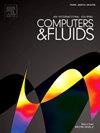MH-DCNet:神经网络与物理求解器耦合的改进型流场预测框架
IF 2.5
3区 工程技术
Q3 COMPUTER SCIENCE, INTERDISCIPLINARY APPLICATIONS
引用次数: 0
摘要
随着智能计算技术的发展,深度学习方法为计算流体动力学(CFD)问题中的快速流场预测提供了有效的解决方案。然而,现有方法在处理不同数据分布导致的物理变量之间的干扰时存在局限性,导致预测性能下降。本文提出了一种改进的流场预测框架 MH-DCNet,它将神经网络与物理求解器结合在一起。具体来说,为了解决数据分布问题,我们设计了一种多头深度卷积神经网络,通过多个编码器和解码器对物理变量进行解耦预测。我们还通过引入平均结构相似性开发了一种混合损失函数,以更好地捕捉流场的复杂空间结构和分布特征。我们利用未见的几何图形和各种流动条件对 MH-DCNet 进行了评估。实验结果表明,MH-DCNet 在效率和泛化能力方面优于其他先进模型。与 CFD 方法相比,它在满足收敛约束条件的前提下将预测过程加快了 2.35 倍。本文章由计算机程序翻译,如有差异,请以英文原文为准。
MH-DCNet: An improved flow field prediction framework coupling neural network with physics solver
With the development of intelligent computing technology, deep learning methods have provided an efficient solution for rapid flow field prediction in computational fluid dynamics (CFD) problems. However, existing methods have limitations in handling interference among physical variables due to different data distributions, leading to a decline in prediction performance. In this paper, we propose MH-DCNet, an improved flow field prediction framework that couples a neural network with a physics solver. Specifically, to address the data distribution problem, we design a multi-head deep convolutional neural network that decouples the prediction of physical variables through multiple encoders and decoders. We also develop a hybrid loss function by introducing the mean structural similarity to better capture the complex spatial structures and distribution features of flow fields. We evaluate MH-DCNet with unseen geometries and various flow conditions. Experimental results show that MH-DCNet outperforms other advanced models in efficiency and generalization capability. It accelerates the prediction process by 2.35 times compared to the CFD method while meeting the convergence constraints.
求助全文
通过发布文献求助,成功后即可免费获取论文全文。
去求助
来源期刊

Computers & Fluids
物理-计算机:跨学科应用
CiteScore
5.30
自引率
7.10%
发文量
242
审稿时长
10.8 months
期刊介绍:
Computers & Fluids is multidisciplinary. The term ''fluid'' is interpreted in the broadest sense. Hydro- and aerodynamics, high-speed and physical gas dynamics, turbulence and flow stability, multiphase flow, rheology, tribology and fluid-structure interaction are all of interest, provided that computer technique plays a significant role in the associated studies or design methodology.
 求助内容:
求助内容: 应助结果提醒方式:
应助结果提醒方式:


